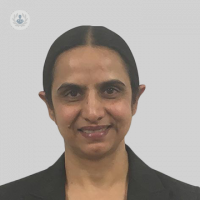Postmenopausal bleeding: is it normal, and what are the main causes?
Written in association with:Postmenopausal bleeding is an uncommon occurrence, and is characterised by women experiencing vaginal bleeding after menopause.
In our latest article, esteemed consultant obstetrician and gynaecologist, Ms Ravinder Kalkat, outlines the most common causes of postmenopausal bleeding, and explains what tests will be carried out for women experiencing the abnormal bleeding.

Is bleeding after menopause normal?
Postmenopausal bleeding is not normal at all. Bleeding stops when the hormones in the body stop being produced. This is when menopause occurs. If one bleeds after menopause, there is a one in 10 chance of getting cancer. This is why postmenopausal bleeding needs to be treated urgently.
Should women visit a doctor at the first sign of postmenopausal bleeding?
The general recommendation is that anyone experiencing or suffering from postmenopausal bleeding should be seen within two weeks, so yes, absolutely, you should see a specialist as soon as you notice postmenopausal bleeding.
What are the most common causes of postmenopausal bleeding?
The most common causes of postmenopausal bleeding are mainly benign. Nine out of 10 cases will not have cancer. The most common benign causes include the following:
Can postmenopausal bleeding stop on its own?
Yes, it can stop on its own if the cause is atrophic vaginitis. However, it will not stop on its own if the main cause of the bleeding originates from polyps.
What tests will women with postmenopausal bleeding have?
The gold standard is an ultrasound scan. This gives us an estimation of the endometrial thickness, which is thickness of the lining of the womb. This is responsive to hormones and so we want to check if there is an increase in thickness. The normal thickness is four millimetres, and anything thicker than this can be associated with pre-cancer conditions as well as cancer.
Once the ultrasound scan has been carried out, the next step is local examination to see if the woman is bleeding locally from the vagina, as a result of atrophy, or from the vulva. The third test we would then carry out, if the ultrasound scan shows signs of increased thickness, is a hysteroscopy. If there is any abnormality, we would remove it at the same time as carrying out this test.
How can postmenopausal bleeding be managed?
A hysteroscopy is not only used as a diagnostic examination, but so too as a treatment option because we can remove any abnormality at the time of performing this test. Once the removed tissue is checked in the laboratory, and if it is normal, then we don’t have to do anything else. Thankfully, In most cases, bleeding stops at this stage.
Ms Ravinder Kalkat is a mightily revered consultant obstetrician and gynaecologist who is an expert when it comes to postmenopausal bleeding. Visit her Top Doctors profile today to schedule a consultation with her.


